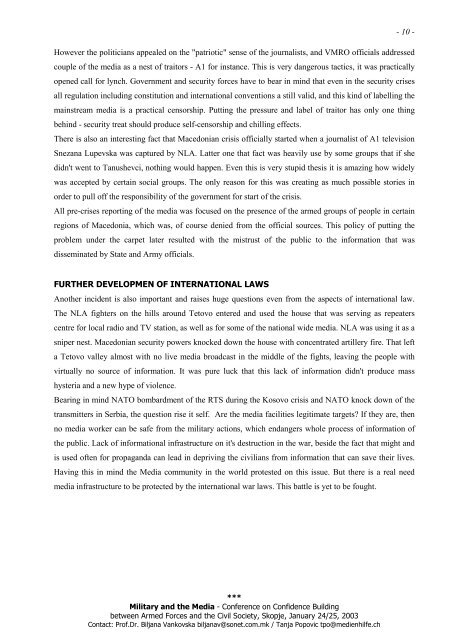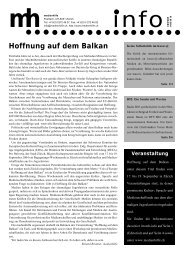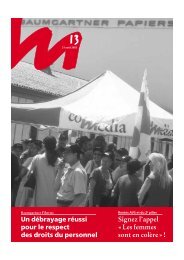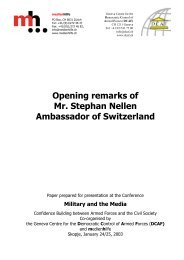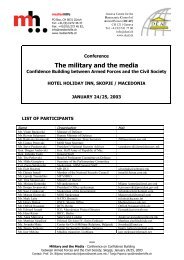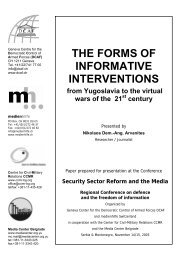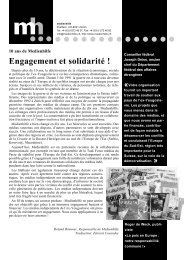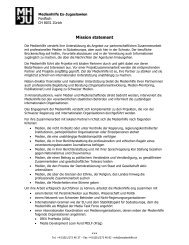Mr. Roberto Belichanec, Media Development Institute ... - medienhilfe
Mr. Roberto Belichanec, Media Development Institute ... - medienhilfe
Mr. Roberto Belichanec, Media Development Institute ... - medienhilfe
Create successful ePaper yourself
Turn your PDF publications into a flip-book with our unique Google optimized e-Paper software.
- 10 -However the politicians appealed on the "patriotic" sense of the journalists, and VMRO officials addressedcouple of the media as a nest of traitors - A1 for instance. This is very dangerous tactics, it was practicallyopened call for lynch. Government and security forces have to bear in mind that even in the security crisesall regulation including constitution and international conventions a still valid, and this kind of labelling themainstream media is a practical censorship. Putting the pressure and label of traitor has only one thingbehind - security treat should produce self-censorship and chilling effects.There is also an interesting fact that Macedonian crisis officially started when a journalist of A1 televisionSnezana Lupevska was captured by NLA. Latter one that fact was heavily use by some groups that if shedidn't went to Tanushevci, nothing would happen. Even this is very stupid thesis it is amazing how widelywas accepted by certain social groups. The only reason for this was creating as much possible stories inorder to pull off the responsibility of the government for start of the crisis.All pre-crises reporting of the media was focused on the presence of the armed groups of people in certainregions of Macedonia, which was, of course denied from the official sources. This policy of putting theproblem under the carpet later resulted with the mistrust of the public to the information that wasdisseminated by State and Army officials.FURTHER DEVELOPMEN OF INTERNATIONAL LAWSAnother incident is also important and raises huge questions even from the aspects of international law.The NLA fighters on the hills around Tetovo entered and used the house that was serving as repeaterscentre for local radio and TV station, as well as for some of the national wide media. NLA was using it as asniper nest. Macedonian security powers knocked down the house with concentrated artillery fire. That lefta Tetovo valley almost with no live media broadcast in the middle of the fights, leaving the people withvirtually no source of information. It was pure luck that this lack of information didn't produce masshysteria and a new hype of violence.Bearing in mind NATO bombardment of the RTS during the Kosovo crisis and NATO knock down of thetransmitters in Serbia, the question rise it self. Are the media facilities legitimate targets? If they are, thenno media worker can be safe from the military actions, which endangers whole process of information ofthe public. Lack of informational infrastructure on it's destruction in the war, beside the fact that might andis used often for propaganda can lead in depriving the civilians from information that can save their lives.Having this in mind the <strong>Media</strong> community in the world protested on this issue. But there is a real needmedia infrastructure to be protected by the international war laws. This battle is yet to be fought.***Military and the <strong>Media</strong> - Conference on Confidence Buildingbetween Armed Forces and the Civil Society, Skopje, January 24/25, 2003Contact: Prof.Dr. Biljana Vankovska biljanav@sonet.com.mk / Tanja Popovic tpo@<strong>medienhilfe</strong>.ch


